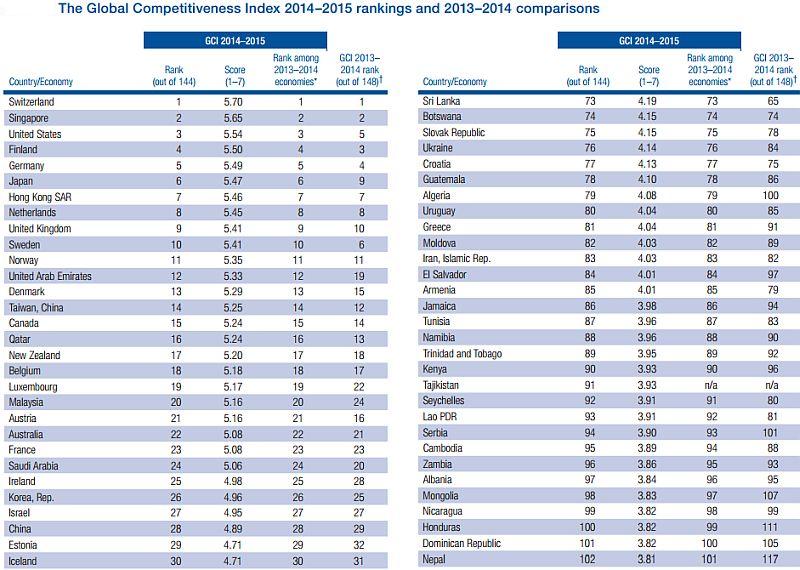Analytics, Economics, EU – Baltic States, Markets and Companies, Rating
International Internet Magazine. Baltic States news & analytics
Saturday, 20.04.2024, 13:04
Estonia still ahead of neighbors in Global Competitiveness Report 2014-2015
 Print version
Print version
Last year, Latvia was ranked 52nd, whereas in 2012 – 55th.
Among the Baltic States, Estonia is still the most competitive – 29th, up three positions. Meanwhile, Lithuania has climbed seven places to 41st.
Among 150 world economies on the Global Competitiveness Index (GCI), Switzerland remains the leader, followed by Singapore, the United States, Finland, Germany, Japan, Hong Kong, Holland, Great Britain, and Sweden.

GCI data on Latvia was collated and submitted by the Center for Sustainable Business at the Stockholm School of Economics in Riga.
"According to the GCI report, the main factors that affect business in Latvia include inefficient government bureaucracy, followed by inefficient tax legislation and administration, access to funding, corruption, and comparatively poorly educated workforce," director of "SSE Riga" Arnis Sauke indicates.
Overall, growth prospects in advanced economies are better than they have been in recent years, albeit very unevenly distributed. The recovery in the United States seems to be comfortably grounded with strong output and employment figures. Japan’s economy, while still needing to translate Abenomics into stronger private demand, seems to be waking up after two decades of stagnation.
In Europe the picture is more mixed, with many countries now recording stronger growth and returning to trend growth rates, while some others continue to suffer from weak growth driven by protracted internal demand, high unemployment, and financial fragmentation. Emerging economies are forecasted to grow more modestly than they did in the past.
The GCI index is calculated according to 12 criteria – institutions, appropriate infrastructure, a stable macroeconomic framework, good health and primary education, higher education and training, efficient goods markets, efficient labor markets, developed financial markets, the ability to harness the benefits of existing technologies, market size, both domestic and international, producing new and different goods using the most sophisticated production processes, innovation.
Analyzing these criteria independently, Latvia's best result is in labor market efficiency, where Latvia is ranked 17th.








 «The Baltic Course» Is Sold and Stays in Business!
«The Baltic Course» Is Sold and Stays in Business!

